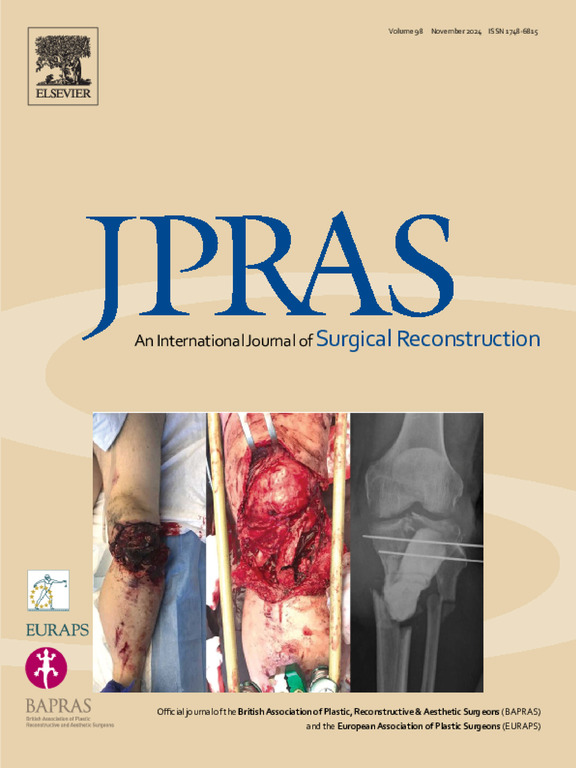The return of in-person plastic surgery interviews and its effect on applicant preferences
IF 2.4
3区 医学
Q2 SURGERY
Journal of Plastic Reconstructive and Aesthetic Surgery
Pub Date : 2025-08-29
DOI:10.1016/j.bjps.2025.08.026
引用次数: 0
Abstract
The 2023–2024 integrated plastic surgery resident selection cycle marked the reintroduction of in-person interviews since the onset of the COVID-19 pandemic. The shift back to in-person interviews, coupled with the recent transition to a pass/fail Step 1 outcome, presented a new landscape for medical students, with the literature displaying increasing trends in research involvement, away rotations, and residency application costs. We aimed to understand the factors influencing the applicants’ decisions to pursue in-person or virtual interviews and financial implications of applying to a plastic surgery residency program. A 24-question Qualtrics survey was distributed via standardized email to the applicants of Saint Louis University’s integrated plastic surgery residency program at the conclusion of the interview. The questions included a 5-point Likert scale or free-response form and assessed demographics, finances, and interview experience. Forty-five surveys were distributed and 37 responses were obtained (82.2% response rate). Data revealed a statistically significant difference in the mean cost for in-person interviews ($554.84) versus virtual interviews ($100). Furthermore, applicant race was significantly related to the need to borrow money toward interview expenses. Despite the rising financial burden of applying to residency, 95% of the applicants indicated a final preference for in-person interviews, thereby highlighting the importance of factors beyond cost in the program selection process. Moreover, distinct financing patterns among racial groups may reflect a disproportionate impact of rising costs. Thus, implementing new scholarships may aid in bridging socioeconomic gaps and attracting the most qualified and deserving applicants.
面对面整形手术面试的回归及其对申请人偏好的影响。
2023 ~ 2024年整形外科住院医师综合选拔周期标志着新冠肺炎疫情后重新引入面对面面试。回到面对面面试,再加上最近过渡到通过/不通过的第一步结果,为医学生呈现了一个新的景观,文献显示在研究参与、轮岗和住院医师申请成本方面有增加的趋势。我们的目的是了解影响申请人决定进行面对面或虚拟面试的因素,以及申请整形外科住院医师项目的经济影响。面试结束时,一份包含24个问题的Qualtrics调查问卷通过标准化电子邮件分发给圣路易斯大学综合整形外科住院医师项目的申请人。这些问题包括5分李克特量表或自由回答表格,并评估人口统计、财务状况和面试经验。共发放问卷45份,获得回复37份,回复率82.2%。数据显示,面对面面试的平均成本(554.84美元)与虚拟面试的平均成本(100美元)在统计学上存在显著差异。此外,申请人的种族与借钱支付面试费用的需求显著相关。尽管申请住院医师的经济负担不断增加,但95%的申请人表示最终倾向于面对面面试,从而突出了项目选择过程中成本以外因素的重要性。此外,种族群体之间不同的筹资模式可能反映出成本上升的不成比例的影响。因此,实施新的奖学金可能有助于弥合社会经济差距,吸引最合格和最值得的申请人。
本文章由计算机程序翻译,如有差异,请以英文原文为准。
求助全文
约1分钟内获得全文
求助全文
来源期刊
CiteScore
3.10
自引率
11.10%
发文量
578
审稿时长
3.5 months
期刊介绍:
JPRAS An International Journal of Surgical Reconstruction is one of the world''s leading international journals, covering all the reconstructive and aesthetic aspects of plastic surgery.
The journal presents the latest surgical procedures with audit and outcome studies of new and established techniques in plastic surgery including: cleft lip and palate and other heads and neck surgery, hand surgery, lower limb trauma, burns, skin cancer, breast surgery and aesthetic surgery.

 求助内容:
求助内容: 应助结果提醒方式:
应助结果提醒方式:


